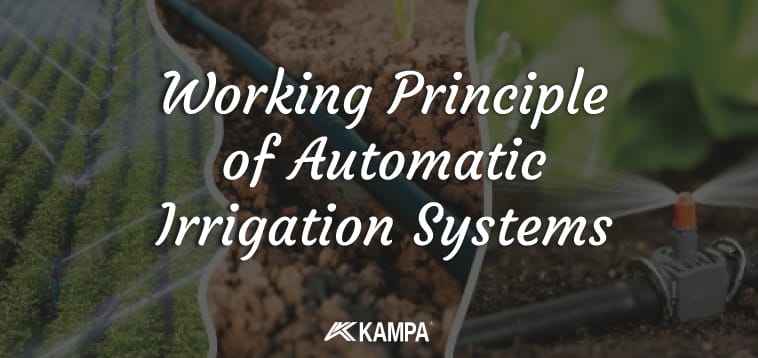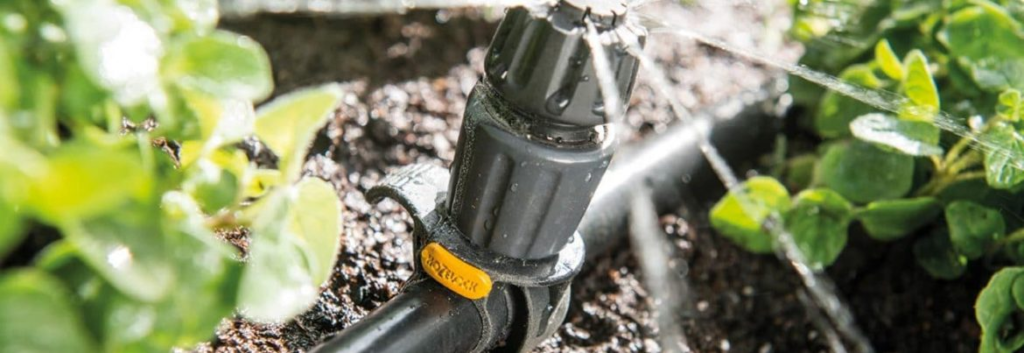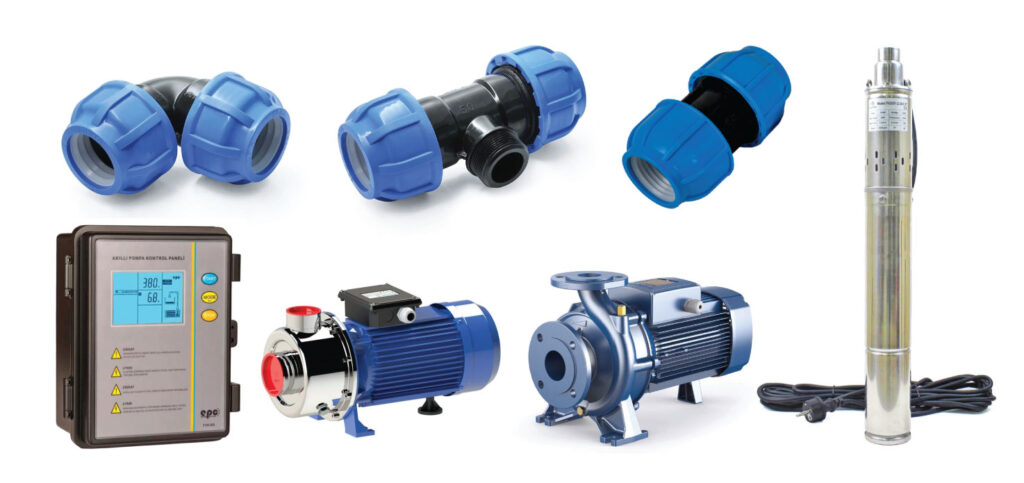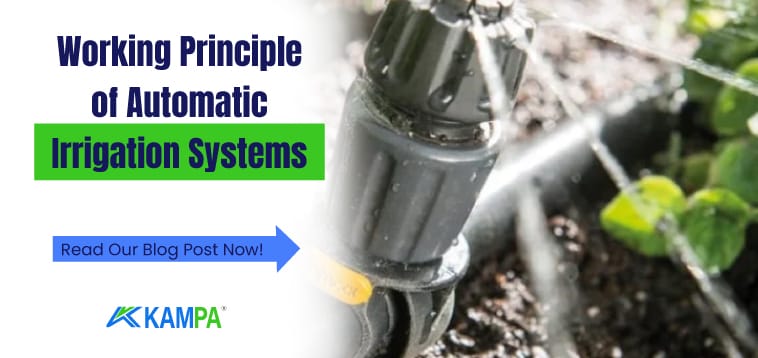Working Principle of Automatic Irrigation Systems
Automatic irrigation systems are systems designed to meet the water needs of plants regularly and effectively. These systems help you use water resources more efficiently and improve the health and growth of plants.
In general, automatic irrigation systems consist of the following components:
Water Source: Usually supplied from sources such as mains water, a water tank or well water.
Pump: Providing pressure to the system, the pump keeps the water moving through the pipeline.
Control System: Components such as timers, sensors and programmable control units manage irrigation schedules.
Pipelines and Suction: Pipes ensure that water is transported to the right areas. Sieves ensure that water is delivered to the root zone of the plants.
Irrigation Heads: Different types of heads, such as drip irrigation heads, spray heads, sprinkler heads, etc., distribute water to the plants.
Sensors: Various sensors, such as soil moisture sensors, rainfall sensors and temperature sensors, adjust irrigation schedules according to the needs of the plants.

Factors to be Considered in the Selection of Smart Irrigation Systems:
Plant Types and Needs: Different plants have different watering needs. The system you choose should be suitable for the type of plants and their water requirements.
Soil Type and Slope: Soil retention capacity, drainage characteristics and slope affect the need for irrigation. These factors should be taken into account in irrigation system design.
Climatic Conditions: The climatic conditions of your region affect the frequency and amount of irrigation. Hot, dry regions may require more frequent and wider irrigation.
Water Source and Pressure: You should choose the irrigation system according to the water source and pressure you use. Drip irrigation may be more suitable for low pressure sources.
Budget: Automatic irrigation systems come in different price ranges. You should choose the appropriate system considering your budget.
Timer and Control Features: Advanced controllers, programmable timers and sensor integration can make the irrigation system more effective.
Ease of Maintenance: The system you choose should offer easy maintenance and repair. User-friendly systems should be preferred over overly complex ones.
Expansion Possibilities: The ability to expand the system as your needs change or your garden expands is important.
Automatic irrigation systems are a great option for watering your plants regularly and accurately, as well as saving water. By considering the above factors, you can choose the system design that best suits the characteristics of your garden.
Which type of automatic pumps should be used according to the characteristics of the irrigation area?
Let us provide a more detailed guide below on which type of automatic pumps should be used according to the characteristics of the area to be irrigated. However, it is important to consider the specific needs and requirements of the site when choosing a pump. Here are some general features for choosing an automatic irrigation pump according to different site characteristics:
- Garden Irrigation:
- In general, drip irrigation or spray irrigation will require pressurized water.
- In this case, surface type automatic irrigation pumps can be preferred.
- The pump should be selected according to the water source and the requirements of the irrigation heads.
- Agricultural Areas:
- Agricultural fields usually require large areas, so pumps with high flow capacity are preferred.
- In drip or sprinkler irrigation systems, the flow and pressure requirements of the pump should be taken into account. (If you are curious about the difference between sprinkler and drip irrigation systems, you can read our blog post by clicking to learn about this subject)
- In cases where water needs to be drawn from deep wells or water tanks, deep well pumps or surface type pumps can be used.
- Areas used in sports (soccer fields, golf courses, etc.):
- It is important to distribute water homogeneously over large areas, so pumps with high capacity and pressure are preferred.
- Pumps that can be integrated with smart sensors can be used to save water.
- Flower beds and potted plants:
- Drip irrigation or spraying systems are preferred.
- Generally, pumps requiring low flow rates can be used.
- Greenhouses
- It usually requires precise irrigation tailored to the needs of the plants.
- Pumps that can be integrated with smart irrigation control units can be preferred.
- Soil and Climate Conditions:
- The drainage capacity of the soil, the rate of water absorption and the climatic conditions of the region affect the frequency and amount of irrigation.
- These factors should be taken into account when selecting a pump.
- Budget:
- It is important to choose a quality and need-oriented pump that fits the available budget.
- Maintenance and Expansion Opportunities:
- The pump you choose should be easy to maintain and you should be able to expand the system when needed.

What are the Materials for Automatic Irrigation Systems?
The materials for an automatic irrigation system may vary according to the design of the system and the characteristics of the area to be used. In general, however, the basic materials used for an automatic irrigation system can be
- Pump: The pump, which draws water from the water source and creates pressure, is one of the key components of irrigation systems. There are different types such as surface pumps, deep well pumps or submersible pumps.
- Pipelines: The pipes that transport water determine where the water is distributed from the irrigation heads. PVC, polyethylene or special irrigation pipes can be used.
- Irrigation heads: Different types of irrigation heads, such as drip heads, spray heads or sprinkler heads, determine how water is distributed to the plants.
- Controller or Timer: A controller or timer is used to manage irrigation schedules and set when and how water is distributed. Programmable and smart models are available.
- Sensors: Sensors such as soil moisture sensors, rainfall sensors, temperature sensors are used to adjust the amount and frequency of irrigation according to the needs of the plants.
- Filters: Filters used to remove particles from the water coming from the pump prevent blockages and damage to the system.
- Coupling and Valves: Valves used to control water flow are used to manage irrigation schedules of different zones or lines.
- Pressure Reducer: It reduces the pressure of the high pressure water entering the system and provides suitable pressure to the irrigation heads.
- Pipe Fittings: Pipe fittings are used to join, convert or route pipes.
- Water Storage Tank or Tank: Storage tanks or water tanks are places where water is collected or stored. Storage capacity can increase the availability of water.
- Cables and Electrical Materials: Cables and electrical materials are used for electrical connections of components such as control units, sensors and pumps.
- Assembly and Connection Accessories: Accessories required to assemble and install pipes, valves and other components.

Automatic Irrigation Systems Materials Prices
Prices and Details for Pump Products:
Click here to learn automatic irrigation pump prices.
Control Unit or Timer Prices:
Click here to find out the prices of control units or timers.
Kaplin ve Vana Fiyatları:
Click to learn coupling and valve prices.
Montaj ve Bağlantı Aksesuarlar Fiyatları:
Click here to learn the prices of mounting and connection accessories.
The quality, durability and compatibility of the materials to be used are important in automatic irrigation system design. You can create an efficient automatic irrigation system by choosing the right materials according to your needs and the area to be used.
Getting professional advice on pump and material selection or getting support from an engineer specialized in irrigation systems can help you make the right and efficient choice.
🚩For product selection and offers;
📳 05495413607
📧 dijital@kampacompany.com
✅ ADDS VALUE TO THE KAMPA…

